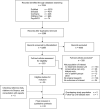Survival of patients who opt for dialysis versus conservative care: a systematic review and meta-analysis
- PMID: 35195249
- PMCID: PMC9317173
- DOI: 10.1093/ndt/gfac010
Survival of patients who opt for dialysis versus conservative care: a systematic review and meta-analysis
Abstract
Background: Non-dialytic conservative care (CC) has been proposed as a treatment option for patients with kidney failure. This systematic review and meta-analysis aims at comparing survival outcomes between dialysis and CC in studies where patients made an explicit treatment choice.
Methods: Five databases were systematically searched from origin through 25 February 2021 for studies comparing survival outcomes among patients choosing dialysis versus CC. Adjusted and unadjusted survival rates were extracted and meta-analysis performed where applicable. Risk of bias analysis was performed according to the Cochrane Risk Of Bias In Non-randomized Studies of Interventions.
Results: A total of 22 cohort studies were included covering 21 344 patients. Most studies were prone to selection bias and confounding. Patients opting for dialysis were generally younger and had fewer comorbid conditions, fewer functional impairments and less frailty than patients who chose CC. The unadjusted median survival from treatment decision or an estimated glomerular filtration rate <15 mL/min/1.73 m2 ranged from 20 and 67 months for dialysis and 6 and 31 months for CC. Meta-analysis of 12 studies that provided adjusted hazard ratios (HRs) for mortality showed a pooled adjusted HR of 0.47 (95% confidence interval 0.39-0.57) for patients choosing dialysis compared with CC. In subgroups of patients with older age or severe comorbidities, the reduction of mortality risk remained statistically significant, although analyses were unadjusted.
Conclusions: Patients opting for dialysis have an overall lower mortality risk compared with patients opting for CC. However, a high risk of bias and heterogeneous reporting preclude definitive conclusions and results cannot be translated to an individual level.
Keywords: conservative care; dialysis; end-stage kidney disease; mortality; systematic review.
© The Author(s) 2022. Published by Oxford University Press on behalf of the ERA.
Conflict of interest statement
Outside the submitted work, C.G.N.V. has received grant support from the Dutch Kidney Foundation and Nephrosearch Foundation; W.R.V. has received grant support from Zilveren Kruis; W.J.W.B. has received grant support from Zilveren Kruis and the Dutch Kidney Foundation; and M.v.B has received grant support from the Dutch Kidney Foundation and Healthcare Evaluation Leading the Change. The remaining authors declare that they have no conflicts of interest.
Figures







References
-
- Davison SN, Levin A, Moss AHet al. . Executive summary of the KDIGO controversies conference on supportive care in chronic kidney disease: developing a roadmap to improving quality care. Kidney Int 2015; 88: 447–459 - PubMed
-
- Farrington K, Covic A, Nistor Iet al. . Clinical practice guideline on management of older patients with chronic kidney disease stage 3b or higher (eGFR<45 mL/min/1.73 m2): a summary document from the European Renal Best Practice Group. Nephrol Dial Transplant 2017; 32: 9–16 - PubMed
-
- Foote C, Kotwal S, Gallagher Met al. . Survival outcomes of supportive care versus dialysis therapies for elderly patients with end-stage kidney disease: a systematic review and meta-analysis. Nephrology (Carlton) 2016; 21: 241–253 - PubMed
Publication types
MeSH terms
LinkOut - more resources
Full Text Sources
Medical

